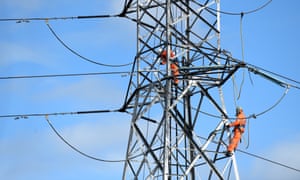Exclusive: Energy Council chief says last-minute changes made without consultation
Australia’s power companies have hit the roof over a last-minute
inclusion in the Morrison government’s controversial energy package
handing the Australian Energy Regulator power to regulate power prices, without judicial review.
The Australian Energy Council, which represents Australia’s electricity and gas companies, has advised its members that the government has, with the new legislation introduced to the House on Wednesday, bypassed the states, and handed the AER power to regulate retail prices.
In a letter to the power companies obtained by Guardian Australia, the chief executive of the Australian Energy Council, Sarah McNamara, claims that last-minute provisions were dropped into the legislation without warning.
The explanatory memorandum tabled with the bill confirms that the AER will be given the function of determining retail prices, and “it is proposed that the amounts would be determined in a non-disallowable legislative instrument that is updated annually”.
McNamara says in the letter: “This is clearly highly alarming –
particularly as it has been introduced without any warning, let alone
consultation, and completely ignores the current Coag and Australian
Energy Market Corporation process.”The Australian Energy Council, which represents Australia’s electricity and gas companies, has advised its members that the government has, with the new legislation introduced to the House on Wednesday, bypassed the states, and handed the AER power to regulate retail prices.
In a letter to the power companies obtained by Guardian Australia, the chief executive of the Australian Energy Council, Sarah McNamara, claims that last-minute provisions were dropped into the legislation without warning.
The explanatory memorandum tabled with the bill confirms that the AER will be given the function of determining retail prices, and “it is proposed that the amounts would be determined in a non-disallowable legislative instrument that is updated annually”.
With the government already in overdrive in an attempt to avoid losing a critical parliamentary vote on the last sitting day of the year – an eventuality that would be a de facto gesture of no confidence in the Morrison government – representatives of Australia’s power companies are in Canberra attempting to persuade kingmaking crossbenchers to put the brakes on the energy legislation.
The Morrison government has begun a conversation with the states about implementing a default retail price, and the companies claim the new pricing powers inserted in the legislation step around that process.
The government crept close to a positive vote on the package on Wednesday night, with key crossbenchers lining up in support, but the controversial legislation is yet to pass the lower house.
The parliamentary program was in chaos on Thursday because of tactical skirmishes in both chambers, but the energy package was expected to return for debate and, possibly, passage in the House of Representatives.
The government has been under acute political pressure about high power prices, and wants an outcome before the next election. The changes cover both energy prices and a much vaunted “big stick” divestiture power.
The divestiture power was reworked after internal objections from more than 20 backbenchers. Government MPs argued that breaking up private companies offended core Liberal values.
The redrafted proposal ensures that divestiture will only happen after a recommendation by Australia’s competition watchdog, which has first sanctioned poor corporate conduct.
The courts would also be the ultimate decision makers, rather than a government minister – the original proposal that triggered an intense backlash in the business community, and arguments that the regime may be unconstitutional.
The government says critics of the package have sided with the power companies instead of consumers.
But Labor has blasted both the package, and the process leading up to it being presented, reworked, to parliament this week.
In the chamber debate on Wednesday night, the shadow treasurer, Chris Bowen, contended that the government legislation had been pulled together in “an all-nighter in the Treasury”. He said it was possible it had drafting errors, given that the government had been forced by its own backbench to rework its original proposal, and experts hadn’t had a chance to examine it.
The shadow treasurer said there were orderly processes in place in the parliament “to stop bad law”.

No comments:
Post a Comment